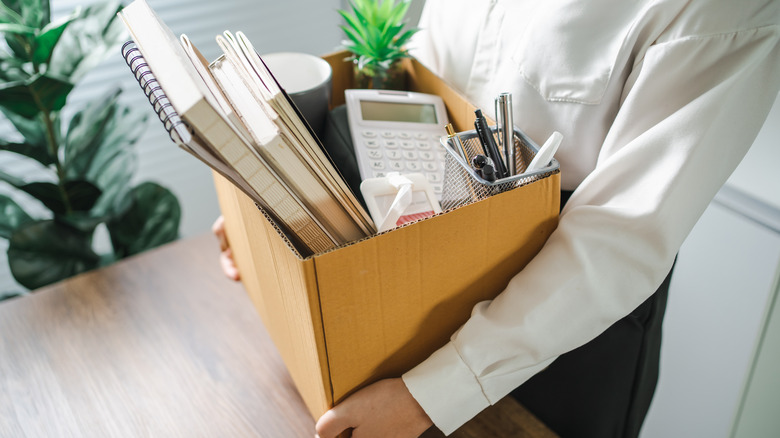How Getting Laid Off From Work Can Affect Your Health
According to The Health Foundation, losing a job can be a source of great emotional stress. Whether it's the result of downsizing, the end of a contract job, or an early retirement you weren't ready for, the loss of your employment as you cope with the financial implications and the impact it will have on your life. This stress can have long-term effects on your mental health, leading to self-esteem issues, anxiety, and depression. A 2009 study published in the Journal of Vocational Behavior showed that the average number of people with psychological issues was 34% for people who were unemployed versus only 16% for people who had jobs.
However, losing a job can affect more than just your mental health. A 2009 study published in The Quarterly Journal of Economics found that even 20 years after the fact mortality rates among displaced workers were 10 to 15% higher than workers who had not lost their jobs. The same study also showed that, for male workers with high seniority, the mortality rate in the year after losing a job was 50 to 100% higher than would be expected under different circumstances.
Getting laid off affects both mental and physical health
Losing a job is not only disruptive to one's income stream, but it can also affect a person's sense of structure, purpose, and even identity (via the American Psychological Association). It can also lead to decreased physical activity and a subsequent increase in body weight, as noted in a 2015 study published in Social Science and Medicine. This study showed that unemployment was associated with more weight gain, as well as increased sleep loss, and a proclivity for other unhealthy behaviors such as smoking and alcohol use.
For some, the loss of a job brings about a grieving process (via WebMD). Depending on your emotional attachment to your job, that grief can lead to stress, anxiety, anger, and frustration. It can also manifest itself in physical symptoms, including migraines, fluctuations in weight, altered sleep patterns, nausea, and aches and pains.
Another effect that unemployment can have on people's health stems from the lack of healthcare. According to a 2022 study published in the Journal of Aging and Health, people who were out of work regularly from their mid-20s through their 40s had significantly poorer physical and mental health by the time they reached 50. This could be partially because of a lack of access to adequate healthcare during their periods of unemployment.
Keeping your body and mind healthy is important
If you do find yourself out of work, it's important for you to continue to take care of your body (via Stanford University). Exercise will not only help you to stay physically healthy, but it is a great way to manage stress. A 2020 study published in Translational Psychiatry showed that a sedentary lifestyle can be linked to a greater risk of depression.
Additionally, WebMD advises you to find ways to manage stress more positively, such as writing down your thoughts in a journal or finding a hobby or pastime that is positive and proactive. In addition, you should avoid seeking quick fixes such as drugs and alcohol that may temporarily provide an escape from your circumstances, but are ultimately destructive and can lead to addictions and other health problems. Instead, incorporate structure into your life, try and find opportunities to network, and make a plan for finding a new job. Your unemployment situation may only be temporary, but the impact on your health and well-being will last long after you've landed your next gig.



